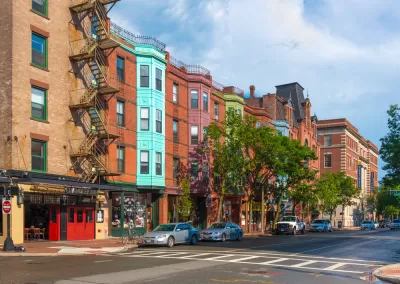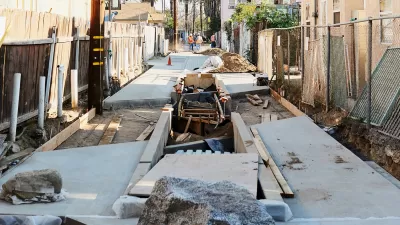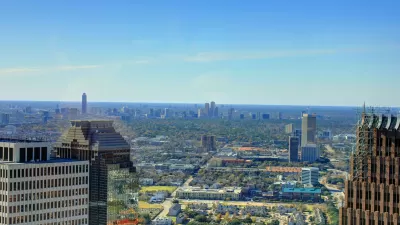The city will start by redesigning curb extensions to incorporate elements that improve flood prevention and stormwater management.

On the heels of appointing its first director of green infrastructure this summer, the city of Boston announced a green infrastructure policy aimed at incorporating sustainability and resilience into “certain small-scale, right-of-way city infrastructure projects,” specifically curb extensions.
Writing in Smart Cities Dive, Katie Pyzyk describes the plan, which has three parts: “five alternative curb bump-out designs that incorporate green infrastructure, two maintenance contracts for upkeep at new green infrastructure installations and a volunteer ‘adopt a space’ program for green infrastructure maintenance.”
Curb bump-outs typically are paved, but Boston’s alternative designs convert the small spaces into water management features. New curb extensions must incorporate at least one of the five named green infrastructure alternatives: bioretention, such as rain gardens; surface infiltration, such as tree pits; porous paving materials; subsurface infiltration, such as underground stone or sand; and one-time seeding for low-grow, evergreen grass or wildflowers.
Pyzyk describes green infrastructure as “a water management approach that mimics nature’s water cycles” and “incorporates plants and other materials to help stormwater absorb back into the ground and improve water quality through filtration.” According to Pyzyk, “green infrastructure reduces stress on existing ‘gray infrastructure’ — traditional stormwater management elements such as roads, drains, gutters, pipes and dams.”
FULL STORY: Boston wants to use curb bump-outs to manage flooding, boost resilience

Planetizen Federal Action Tracker
A weekly monitor of how Trump’s orders and actions are impacting planners and planning in America.

San Francisco's School District Spent $105M To Build Affordable Housing for Teachers — And That's Just the Beginning
SFUSD joins a growing list of school districts using their land holdings to address housing affordability challenges faced by their own employees.

The Tiny, Adorable $7,000 Car Turning Japan Onto EVs
The single seat Mibot charges from a regular plug as quickly as an iPad, and is about half the price of an average EV.

Seattle's Plan for Adopting Driverless Cars
Equity, safety, accessibility and affordability are front of mind as the city prepares for robotaxis and other autonomous vehicles.

As Trump Phases Out FEMA, Is It Time to Flee the Floodplains?
With less federal funding available for disaster relief efforts, the need to relocate at-risk communities is more urgent than ever.

With Protected Lanes, 460% More People Commute by Bike
For those needing more ammo, more data proving what we already knew is here.
Urban Design for Planners 1: Software Tools
This six-course series explores essential urban design concepts using open source software and equips planners with the tools they need to participate fully in the urban design process.
Planning for Universal Design
Learn the tools for implementing Universal Design in planning regulations.
Smith Gee Studio
City of Charlotte
City of Camden Redevelopment Agency
City of Astoria
Transportation Research & Education Center (TREC) at Portland State University
US High Speed Rail Association
City of Camden Redevelopment Agency
Municipality of Princeton (NJ)





























